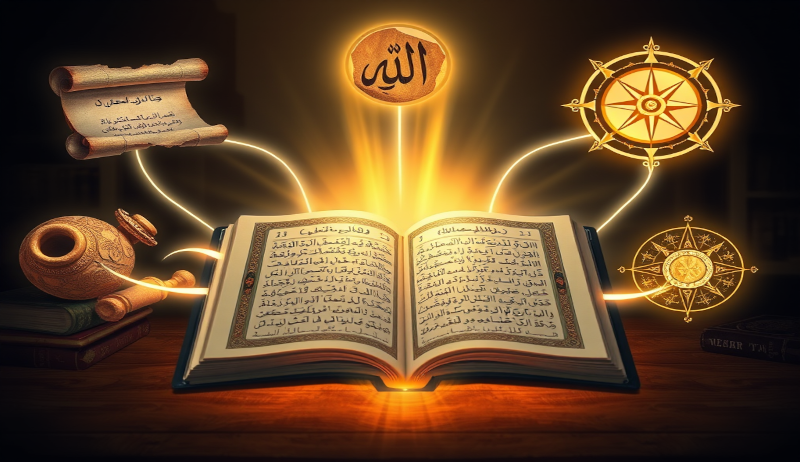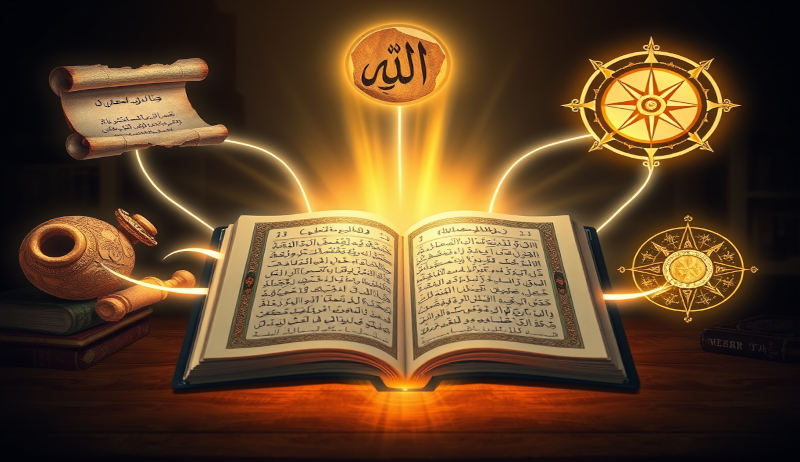Our Perspective on Holy Texts: Allegations of Distortion, Blind Acceptances, and the Quran's Consistent Message

Dear readers,
Today, I would like to discuss with you an important topic that invites us to question our deeply rooted assumptions about sacred texts and our belief systems. My goal is to help us better understand the Qur'an's perspective on other divine scriptures in a more consistent manner, thereby strengthening the solidity of our personal faith and deepening interfaith understanding.
Introduction: From Blind Assumptions to Questioning
As human beings, we are shaped by the values, beliefs, and ideas of the society in which we are born and raised. This is a natural process, as societal assumptions form the foundation of an individual's worldview and identity. However, this can also create a cognitive "blind spot": ideas that have been long accepted can rise like a fortress in our minds, triggering an automatic defense mechanism against opposing views. This reflexive reaction often becomes more important than the actual truth of the values, ideas, and beliefs we were raised with. The real issue is not their accuracy, but how "sacred" and "indispensable" they are to us. In this pursuit, our minds play various games to justify our assumptions and seek ways to validate them.
The Psychological Foundations of Faith and Our View of Other Sacred Texts
This psychological mechanism becomes even more pronounced when it comes to religious beliefs. We believe, without any justified reason, that our own sacred scripture (for example, the Qur'an) is correct, infallible, and error-free. This has turned into a "presupposition," a reflex: in a Muslim society, an individual is taught that the Qur'an is sacred, infallible, and flawless, so they accept and defend it without question.
This attitude also leads to a deep exclusion and criticism of other sacred texts. While blindly defending our own scripture, we harshly criticize, even scorn and reject, other sacred texts at the slightest perceived "error" or "inconsistency." At the root of this behavior are common narratives that portray other religions and their scriptures as "demonic," "corrupted," or "altered for human gain." Individuals raised with such stories tend to overlook or rationalize (through interpretation) any apparent irrationalities or contradictions in their own scripture, while outright rejecting other scriptures without any investigation. Our general approach to the Torah and the Gospel, unfortunately, is shaped by this psychology. Generations raised and indoctrinated with these ideas evaluate the Torah and the Gospel through the lens of "corruption." However, upon closer examination, it becomes evident that this perspective shifted negatively only around the 10th and 11th centuries.
Problems of Misinterpretation and Mis_translation in Qur'anic Verses
Regrettably, our preconceptions and cultural heritage even influence the translation and interpretation of Qur'anic verses. The prejudice that the Torah and the Gospel are "corrupted" leads to distortions of the intended meaning of certain verses.
For example, in Surah Ali Imran, verse 3, the phrase "beyne yedeyhi", which means "in its hands" or "among its hands," is often translated as "previous" or "preceding," creating the impression that the Qur'an only endorses the original, uncorrupted versions of earlier scriptures. In reality, this expression indicates that the Qur'an confirms the books that were in the hands of the People of the Book at the time of its revelation. Some translators add phrases like "its original" to the text, causing a shift in meaning, as if the Qur'an is approving only the pristine versions of these books. For instance, Mehmet Okuyan's interpretation in his translation and exegesis adds "its original" in parentheses, which is a striking example of injecting the translator's own beliefs into the text. Other translators, like Hakkı Yılmaz, avoid such parentheses but still present their interpretations as an integral part of the text. Additionally, the verb "tasdik etmek" (to confirm) is translated as "corrective and verifying" in the context of the People of the Book's scriptures, while in other contexts (such as confirming the Day of Judgment), it is simply left as "to confirm," highlighting the translators' inconsistencies in projecting their beliefs onto the text.
Another significant mistranslation appears in Surah Al-Ma'idah, verse 44. The verb "yahkumu", which should be in the present tense meaning "rules" or "judges," is often translated in the past tense as "they were ruling". This translation is a deliberate distortion aimed at limiting the validity of the Torah's rulings to the past. Because if the prophets were still acting according to the Torah's rulings and judging by them at the time of the Qur'an's revelation, this would indicate that the Torah had not been corrupted. This same bias is reflected in verses like Al-Ma'idah 5:68, Al-Ahqaf 46:12, Al-Baqarah 2:113, and 2:44, where verbs such as "they read" or "you read" are translated in the past tense to project the same prejudice.
A Qur'anic Perspective on Claims of Corruption in the Torah and the Gospel
Our widespread belief that the Torah and the Gospel have been corrupted is typically based on Surah Al-Baqarah, verse 79. However, a deeper examination of this verse reveals a very different picture.
When analyzing Surah Al-Baqarah, verse 79, it is crucial to read it in conjunction with verse 80. When evaluated holistically, the statement "Woe to those who write the scripture with their own hands and then say, 'This is from Allah,' for a paltry price!" does not refer to the alteration of the Torah's text, such as deleting or adding words. Instead, it targets interpretations of the Torah and books derived from those interpretations. Specifically, it criticizes Jewish scholars (rabbis and hahams) for presenting their own interpretations and ideas as if they came from Allah. Leading examples of such texts include the Talmud and Mishnah.
A striking illustration of this semantic corruption is the verse on retaliation. The Torah explicitly states "an eye for an eye, a tooth for a tooth", but Jewish rabbis have twisted it into compensation (blood money). The Qur'an condemns this intentional misinterpretation, which effectively corrupts the meaning of the Torah's verse. Similarly, crimes like adultery and murder, which the Torah prescribes as punishable by death, have been altered by Jewish scholars to involve compensation, representing another form of semantic corruption.
In Surah Al-Baqarah, verse 80, the phrase "The Fire will not touch us except for a few days" should be understood in this context. This refers to claims in the Talmud's Rosh Hashanah section that Jews who sin will only remain in hell for 12 months. The Qur'an criticizes Jewish scholars for writing such ideas and presenting them as divine truth by saying "This is from Allah." The expression "for a paltry price" critiques how these interpretations serve as a means of worldly gain or authority for religious leaders.
Therefore, Surah Al-Baqarah, verse 79 criticizes not the textual alteration of the Torah, but the deliberate misinterpretation of its verses by Jewish scholars—corrupting their meaning and attributing them to Allah. Muslims should also draw a lesson from this, ensuring that when interpreting verses, they do not present their own views as divine.
Furthermore, the Qur'an contains numerous references, directions, and affirmations to previous scriptures. In Surah Al-Ma'idah, verse 68, it states that the People of the Book will not stand on anything unless they uphold the Torah, the Gospel, and what has been revealed to them from their Lord. In Surah Al-Ma'idah, verse 43, it asks, "Why do they make you their judge when the Torah is with them?" In Surah Al-Ma'idah, verse 47, it commands, "Let the People of the Gospel judge by what Allah has revealed in it." These verses clearly show that, even at the time of the Qur'an's revelation, these books were valid and authoritative. If they had been completely corrupted, would Allah command people to judge by a corrupted book? This would contradict divine justice.
As stated in Surah An-Nisa, 4:136 and Surah Ali Imran, 3:119, we must believe in the Torah and the Gospel in the same way we believe in the Qur'an—if they have been destroyed or entirely corrupted, what meaning would faith in them hold? How could the Qur'an affirm them?
The fact that the Gospel texts in the hands of Christians were written after Jesus by his disciples under the guidance of the Holy Spirit is also significant. In Surah An-Nisa, 5:111, it mentions that revelation was given to the disciples who believed in me and my messenger. This aligns with statements in the Gospel of Luke, such as "This is my Son, the Chosen One; listen to him," and in the Gospel of John, "But the Helper, the Holy Spirit, whom the Father will send in my name, will teach you all things and will remind you of everything I have said." This indicates that the Qur'an indirectly endorses the formation process of the Gospel.
The Preservation of Sacred Texts and Divine Justice in the Context of the Torah and the Gospel
It is essential to ask some fundamental questions about the widespread claims of corruption: Looking at the Qur'an, in Surah Al-An'am, verse 34, it says, "No one can change the words of Allah." Similarly, in Surah Al-An'am, verse 115, it states, "The words of Allah are complete in truth and justice; no one can change His words." We see a similar expression in Malachi 3:6. 1
In light of these verses, do you think Allah Almighty would truly allow His words and scriptures to be changed? Has He not protected them in some way? If you do not believe that the statement in Surah Al-An'am, verse 115—"No one can change the words of Allah"—applies to all His words, then the Torah and the Gospel were never His words to you. Or does Allah make distinctions among His own words? How do you explain this faith-based contradiction?
The Qur'an, in Surah Al-Ankabut, verse 46, says, "Say, 'We believe in what has been revealed to us and to you.'" Yet, as those who believe these books have been corrupted, completely changed, or even lost, how can we sincerely utter these words to them? How can we claim to believe in books we deny and have no faith in?
If this corruption and alteration occurred shortly after the revelation of these scriptures and Allah did not address it for centuries, would that not mean He left humanity adrift in a sea of sin for ages? Would Allah send books to people, only to allow them to be corrupted, destroyed, or altered shortly afterward, leaving them submerged in sin for centuries? Does this align with divine justice?
If we claim that the Torah and the Gospel have been corrupted, do we have any evidence of the so-called "original" versions beyond the ones that have existed throughout history? Can we prove their existence? It is also important to note that scholars like Ibn Khaldun, Muhammad Abduh, Razi, and many others did not view the issue of corruption in the same way we do.
Conclusion: A Call for Consistency and a Fair Approach
The questions above demonstrate the need for a thorough examination of our common assumptions about sacred texts and belief systems. We must apply the same diligence, contextual awareness, and holistic perspective that we use when approaching our own scripture, the Qur'an, to other sacred texts like the Torah and the Gospel. We should exert the same effort to understand a verse in another scripture as we do for our own, examining them with a fair and critical eye free from prejudices.
For the concept of corruption often refers not to textual changes, but to semantic distortions—misinterpreting texts to fit one's ideologies. When the Qur'an affirms the Torah and the Gospel, it is endorsing their existing forms at that time. Therefore, it is essential for Muslims to approach other sacred texts with respect, to have faith in them, and to avoid projecting their own interpretations and preconceptions onto the texts by claiming "This is from Allah."
Instead of blind assumptions and preconceived judgments, the courage to seek the truth, rely on evidence, and question will lead us to a deeper and more meaningful faith. This consistency will ground our beliefs on firmer foundations and enable more constructive dialogue with people of different faiths.
Best regards,
Cumhur Erentürk
Similar Expressions in the Bible:
- Malachi 3:6 (Old Testament)
- Verse: "For I the Lord do not change; therefore you, O children of Jacob, are not consumed."
- Explanation: This directly echoes the idea of God's unchanging nature, implying that His words and promises remain constant and unalterable, as referenced in the original article.
- Isaiah 40:8 (Old Testament)
- Verse: "The grass withers, the flower fades, but the word of our God will stand forever."
- Explanation: This verse stresses the eternal and unchanging quality of God's word, contrasting it with the temporary nature of the physical world, much like the Qur'anic emphasis on God's words being unchangeable.
- Psalm 119:89 (Old Testament)
- Verse: "Forever, O Lord, your word is firmly fixed in the heavens."
- Explanation: Here, God's word is described as eternally fixed and unmovable, aligning with the concept that no one can alter or change it.
- Matthew 24:35 (New Testament)
- Verse: "Heaven and earth will pass away, but my words will not pass away." (Spoken by Jesus)
- Explanation: Jesus affirms the permanence of His words, suggesting they are divine and beyond human alteration, similar to the protection of God's words in the Qur'an.
- 1 Peter 1:24-25 (New Testament)
- Verse: "All flesh is like grass and all its glory like the flower of grass. The grass withers, and the flower falls, but the word of the Lord remains forever."
- Explanation: This echoes Isaiah 40:8 and reinforces the idea that God's word is everlasting and immune to decay or change.
- Hebrews 13:8 (New Testament)
- Verse: "Jesus Christ is the same yesterday and today and forever."
- Explanation: While focused on Christ (who is often seen as the embodiment of God's word in Christian theology), this verse highlights the unchanging nature of God, which extends to His revelations and promises.
- Proverbs 30:5-6 (Old Testament)
- Verse: "Every word of God proves true; he is a shield to those who take refuge in him. Do not add to his words, or he will rebuke you and prove you a liar."
- Explanation: This warns against altering or adding to God's words, emphasizing their truth and integrity, which parallels the Qur'anic stance on the preservation of divine revelation.



Comments ()